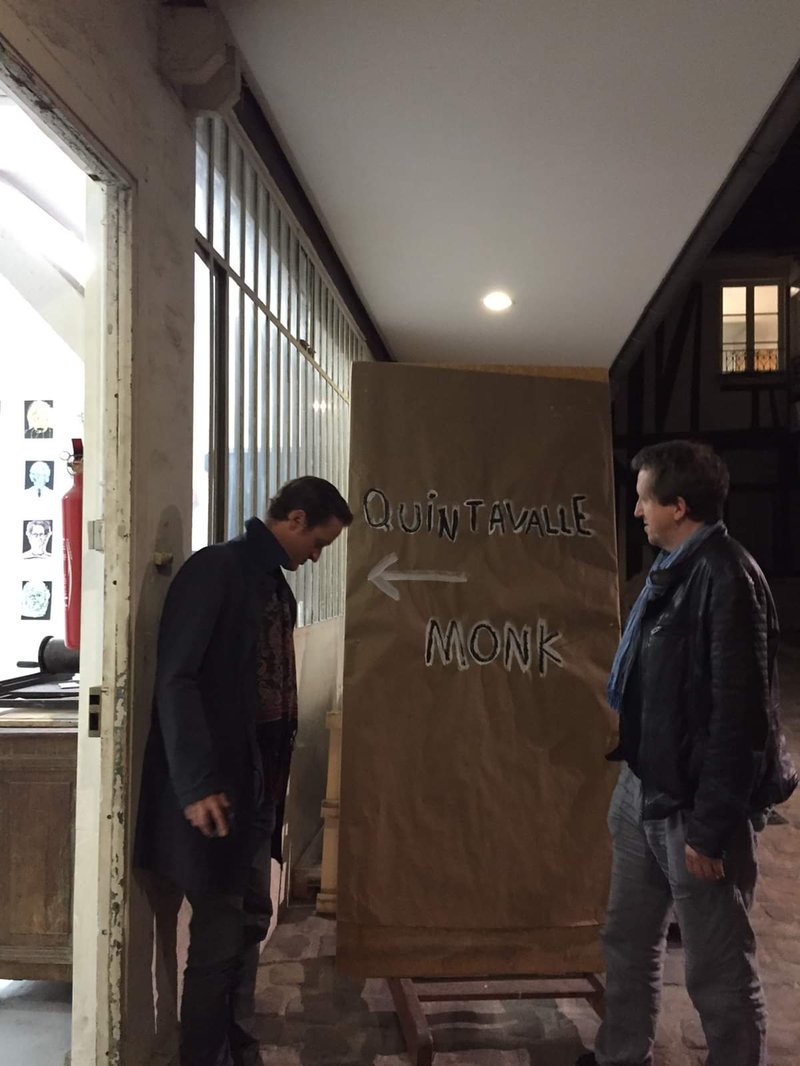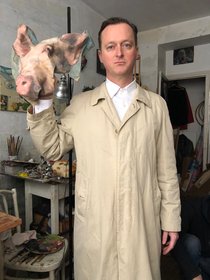-

-
The Discerning Mollusk's Guide to Arts & Ideas
-


first met Ian in 2010 when I was invited to take part in a poetry festival and Ian was commissioned to translate my poems into French. I had come across Ian’s work a few years earlier through his bilingual poetry collection, N/S, which I thought was excellent so I was very touched when he wrote to me saying how much he had enjoyed translating my work and proposing we meet for a drink when he was next in Paris (at that time he was living in Lille). I didn’t know that this would be the start of a beautiful, intense friendship of the sort that happens less and less frequently the older you get. Nor did I realize at the time that so much of Ian was contained in that first meeting—the almost effortlessly gifted translator, the generous mentor who took pleasure in teaching and encouraging others, the two poles of literary Paris, where he was feted as an intellectual, and working class Lille, where he loved exploring the seediest, most marginal parts of existence. And, of course, the drink. Alcohol killed him in the end but it also provided him with the motor fuel that produced a phenomenal amount of work spanning three decades. And it also made for some wonderful Rabelaisian moments along the way of which I was more than happy to partake. Would it have been better to have Ian without the drink? Maybe, and there was a moment in his life, of which I have fond memories, where he wasn’t drinking at all. We would still meet for our regular lunches—appropriately enough for two perfidious Brits at a restaurant called Albion—and the conversation would still flow abundantly, with me on the wine and him on the water.
That was another of Ian’s qualities: a total lack of judgment (unless he thought you were pretentious or a pseudo-intellectual in which case the judgments were severe). The fact that he was sober didn’t mean he objected to you getting pie-eyed in the middle of the afternoon. I think that great openness of spirit was one of the defining traits of Ian’s character and one that perhaps allows us to reconcile all the seemingly contradictory parts of his character. His final collection, published by Make Now Books, is called We Did Everything, which, while clearly impossible on a purely physical level, in some ways sums up Ian’s approach to life: « I am going to have as many experiences as possible and read and write as much as I possibly can. » I think the drink was a way of facilitating that—it allowed him to meet the multigenerational unemployed in the PMUs of suburban Lille or the IRA gun-runners of Paris, and it allowed him to explore lyrical and imaginative flights of fancy that may have been inaccessible otherwise. I also wonder if it wasn’t a way of simply slowing down his brain and getting him to a point where he was functioning on a similar level to most of the rest of humanity. I read a similar observation along these lines about Frank O’Hara—that he could put away amounts of booze that would have most people stumbling drunk and then hold a perfectly normal conversation.
Except those conversations, while normal in speed and rhythm, were anything but normal in terms of content. We Said Everything. Ian could hold forth on French and English prosody and why it was hard to compose limericks in French, then tell you about interviewing Shane MacGowan, then switch to Catullus (he had studied Classics at Bristol), the merits of different translations of Dante, teaching poetry to a convicted cannibal in prison, post-Brexit Britain and representative democracy, and the time he spent the night with a bunch of French Foreign Legionaries who beat a man to death in front of his eyes. This omnivorous approach to life (Ian, who despised religion, would snarl if I called it catholic) could at times be almost terrifying but it was intoxicating too. And I think it also spoke to a certain form of ethics: homo sum, humani nihili a me alienum puto.
We can’t have those conversations any more, and towards the end they were already becoming rarer and rarer as Ian’s alcohol abuse damaged his body, mind and those around him, but we do still have his books. While Ian is best known in the English speaking world as a translator (if and when his version of George Perec’s La Disparition is posthumously published that reputation will surely increase) he considered himself first-and-foremost a poet and, despite his punky, abrasive exterior, took pride in belonging to this, the second oldest of professions. So where amongst his poetry to start?
If you read French then Plouk Town is the obvious first port of call. This book-length poem is set in a working class neighborhood of Lille and it is unlike anything previously published in French, through the combination of its subject matter (the marginal lives of the denizens of a poor French suburb), its technical versatility (like pretty much everything Ian wrote it used fiendishly difficult formal constraints) and the musicality of its language (reading Ian in French one is reminded of Paul Valery’s observation that poetry is « a long hesitation between sense and sound »). Ian felt that this was the work he would be remembered for after his death and there is a consensus that this was in many ways his masterpiece.
If you enjoyed Plouk Town and want to go further down that path there are two sequels Là and Vers de L’Infini, all three of which are published by Cambourakis. If you want to try something a little different I would recommend his extraordinary three-dimensional poem, Twin Towers, which is published by Les Mille Univers in Bourges (another key location in the Monkian geography). I remember Ian reading from this poem at a joint reading we gave in 2015 and thinking it was brilliant; then when I spent some time with the finished object I was, if you’ll forgive the image, blown away. The book is sold in the form of a box kit, like a flat pack Ikea package, and when assembled takes the form of two tall rectangles which are covered on all four sides by lines of verse, 111 lines per side and 24 characters per line. This simple, symmetrical composition allows for almost endless reading possibilities depending on whether you choose to read from top to bottom, follow the lines around the four walls of the tower or move from one tower to another. It’s an extraordinary formal tour de force and, as you read the words themselves, a beautiful humanistic statement too. Ian, who could be the rudest, most cynical person you’d ever meet also had a deep love for and fascination with life; all those wildly disparate lives that were destroyed that day must have stirred something visceral in him and this beautiful work is his response.
The book I mentioned earlier, N/S, is an obvious next stop if you have a little French. The poems in this collection were written in partnership with Ian’s friend and fellow Oulipian, Fred Forte, and the lines of each poem alternate between Ian’ English and Fred’s French. Once the two of them had got to the end of the project Ian went back and translated all the poems—French into English and vice versa—and the translations are also published here. I love this book, which is available from Les Éditions de l’Attente, both because it was my first encounter with Ian’s work and also because of the wonderful way it plays with the ambiguity between the two languages; some words are literally identical in the two languages, while others look the same but mean radically different things. Give us this day our daily pain. Ian’s interview with the Canadian translator, Chris Clarke, discusses this process, among many other topics, and is both a good companion piece to the book and also a good proxy for those who didn’t have the pleasure of conversing with Ian.
For those who only read English you have We Did Everything and Family Archaeology (both published by Make Now Press) and also 14 x 14 (a translation of a French work also called 14 x 14) which is published by Sagging Meniscus. Ian also contributed to several publications about the Oulipo, most notably Oulipo Compendium (edited by Harry Mathews & Alastair Brotchie) and All That is Evident is Suspect: Readings from the Oulipo 1963-2018 which he co-edited with Daniel Levin Becker.
The Oulipo (or Ouvroir de littérature potentielle) was another pole in Ian’s existence, and in a way another contradiction: how could someone so determined up until the very end to be free and live according to his own rules want to be part of a group which obliges its members to work in the most rigorously constrained and convoluted ways possible? In one sense of course there is no contradiction at all: Ian made his own rules within the Oulipo and ploughed his own furrow. But in another sense I think there is another, final contradiction here that deserves to be teased out. Ian didn’t want to belong to society as it is—he was a genuine rebel and outsider and felt at home with the marginalized of this world—but he was also an abundantly kind person and I think, like all of us, both loved and wanted to be loved. Despite the sneering Mark E. Smith exterior, his various communities mattered deeply to him—his friends, his students, the outcasts, the writers. And of course, above all, his family. He was outside of society as a whole but inside those societies he had chosen to belong to and helped bring into existence. It was precisely because the society he encountered was mean-spirited, unjust and petty-minded that Ian, both in his books and in his anarchic generosity, set about creating an alternative.
Friendship with Ian was not always plain sailing but I will remember him as one of the kindest and most creative people I have ever met. We will all have our own memories of this unique and uniquely ornery character but for me that kindness and creativity expressed themselves in the support and encouragement he gave to me as a younger, lesser-known writer and in the friendship that evolved out of that. You were truly one of a kind, Ian, and I’m honored to have shared stages, pages, lunches, dinners and even briefly a home with you.


Rufo Quintavalle is an actor and a poet. He studied at Oxford and the University of Iowa and lives in Paris. He is the author of numerous books of poetry, including Shelf (Sagging Meniscus, 2021), described by Daniel Levin Becker as “a consummate work of potential literature”.